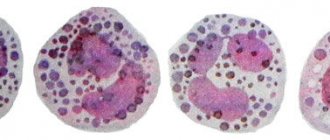With the advent of pregnancy, a radical restructuring of the main and secondary processes of life occurs in a woman’s body. From now on, the work of all structures of the female body is aimed at providing comfortable conditions for the development of the fetus. Also, adaptive changes, the dynamics of which can be tracked based on the results of clinical analysis, occur in the environment of blood cells. In the article we will dwell on the question of how neutrophils behave in the blood during pregnancy.
Neutrophils are the most numerous type of leukocytes. During the gestation period, the leukocyte formula is mobile: for the body of a pregnant woman this is a variant of the norm. The same indicators in a normal (non-pregnant) state of the body usually indicate the presence of pathology. However, under a certain set of circumstances, a shift in leukocyte counts in the blood of the expectant mother is a symptom of a particular disease. Doctors determine the nature of these changes through a comprehensive examination of the pregnant woman.
Research and its results
When a doctor interprets the results of a blood test, he first checks the ratio of band and segmented neutrophils.
They differ from each other in cytological structure and quantity. During pregnancy, segmented cells increase more often, and band cells increase significantly less frequently. The content of neutrophils is assessed from two points of view: relative to all other types of leukocytes (as a percentage) and the number of cells in one liter of blood (absolute number). The normal absolute cell count per liter of blood is no more than 1.7-6.5*10⁹ units/l. The normal relative content ranges from 40 to 78%. Immature forms - band neutrophils - make up only 6%.
Deviations from the abs (absolute) norm in tests and relative ones have different reasons, so all numbers are assessed only by a doctor.
Carrying out a blood test requires compliance with some recommendations on the part of patients in order for the result to be reliable:
- do not overload the body with physical labor the day before;
- do not take medications;
- avoid hypothermia and stressful situations;
- Do not consume alcoholic drinks or food 8 hours before the procedure.
If these requirements are not met, the results of the study may be distorted. You will need to donate blood again to confirm low or high neutrophils during pregnancy.
Blood analysis
Is treatment always necessary?
Neutrophil cells of the band type should normally have stable indicators. With the development of any significant deviations, it is necessary to conduct a high-quality diagnosis in order to identify the etiological factors of such changes. It cannot be argued that one deviation is more dangerous or safer than another. After all, we are talking about a pregnant woman, whose health deviations can end very sadly.
Neutrophilia or an increase in the neutrophil count indicates an active fight against the infection taking place at this time. It is important to correctly identify the source of infection and begin treatment on time. Otherwise, leukocyte cell overconsumption will occur and immune forces will be depleted. Therefore, an increased level of neutrophils may indicate dangerous conditions, in which case it requires the necessary treatment.
- Band Neutrophils Are Increased During Pregnancy Reasons
If there is a serious infection, antibiotic therapy, immunostimulants and corticosteroids are prescribed. But not every drug is suitable for pregnant women, so prescriptions are made by a specialist, taking all necessary precautions.
Diagnosis of neutrophilia
To determine a pathological increase in neutrophil levels, a woman needs to undergo a blood test, which is carried out in any medical institution. It is necessary to donate blood from a vein, always on an empty stomach. Laboratory staff will then use specialized microscopic equipment to determine the number of neutrophils and other blood cells.
The same preparation rules apply to this study as for regular blood donation. That is, a few days before collecting the biomaterial, it is forbidden to eat fatty foods and various smoked foods; you should also exclude alcohol and any medications. Physical overexertion is also prohibited, since it can also distort the true results of the study. If the level of neutrophils significantly exceeds during pregnancy, the mother is prescribed additional tests such as ultrasound diagnostics and bacterial culture, scraping from the surface of the tonsils and laboratory tests of feces and urine.
Depending on the data received, the doctor selects the most optimal, effective and safe treatment, because not all medications and therapeutic procedures are suitable for pregnant women. Neutrophilia is usually caused by inflammatory lesions, so antibiotic drugs that are safe for pregnant women are used for therapy. To eliminate any risks for mother and baby, it is necessary that all appointments are made exclusively by an obstetrician-gynecologist or a doctor of another, more narrow specialization, in accordance with the localization of the inflammatory process.
Why is the level increased?
Neutrophils may be elevated in a pregnant woman because the immune system is not working as usual. There is nothing wrong with this if the young mother is not bothered by painful symptoms. If an increase in the level of cells is accompanied by a clinical picture, then the development of some pathology is possible.
The most common causes of elevated neutrophil levels in pregnant women are the following diseases:
- acute inflammatory process;
- tissue necrosis that occurs during burns, gangrene, myocardial infarction;
- blood diseases;
- malignant neoplasms;
- infectious diseases;
- Chemical poisoning.
If there is no suspicion of any disease, and neutrophils are increased during pregnancy in the blood, then this may indicate a threat of miscarriage or premature birth. Therefore, you need to pay close attention to this indicator, although in many cases it does not portend anything dangerous.
Infection causes an increase in neutrophils
Symptoms and signs of elevated neutrophils
The cause of neutrophilia and its severity affect the symptoms of the disease. Most often, women with this disorder suffer from:
- weaknesses;
- headaches;
- increased body temperature;
- increased sweating;
- vertigo;
- sudden fainting;
- increased heart rate;
- abdominal pain;
- causeless weight loss.
The presence of one of the above conditions is a reason to consult a doctor.
Headache
What does this mean for mother and child?
Neutrophilia occurs due to the presence of inflammation in the body. Ignoring this process can lead to:
- Segmented blood neutrophils: normal indicators and causes of deviations from the norm
- increased inflammation;
- stroke;
- heart failure;
- the occurrence of a malignant tumor;
- intoxication.
The above conditions can cause the death of the mother and the unborn baby.
Treatment methods for elevated levels
Diagnosis and treatment can only be carried out by a qualified specialist. Medications are selected very carefully, because most of them are contraindicated for expectant mothers and the fetus. Most often, therapy for neutrophilia is carried out:
- "Vilprafen";
- "Oscillococcinum";
- "Polygynax";
- "Viferon";
- "Elevit Pronatalem".
"Oscillococcinum"
Nutritional features to reduce neutrophils
There is no special diet for neutrophilia, so pregnant women are advised to follow standard rules of balanced nutrition. It is very important that the foods consumed are enriched with microelements that will ensure the proper functioning of the body.
Experts advise expectant mothers to completely abandon everything:
- fried;
- canned;
- acute;
- fat.
Carbonated water and drinks are also prohibited.
The diet should contain:
- seafood;
- lean meat;
- vegetables and fruits;
- cereals
It is better to cook dishes by steaming. You need to eat 5-6 times a day in small portions. It is extremely important to maintain proper drinking regime.
Proper nutrition
Reasons for the increase
If neutrophils are increased in the blood of women during pregnancy, we are talking about a condition such as neutrophilia, or neutrophilia. An increase in the level of neutrophils to 10X10⁹ per liter indicates moderate neutrophilia. If the content reaches from 10 to 20Х10⁹/l, we are talking about pronounced. We can talk about severe if the level of granulocytes is from 20 to 60X10⁹/l. Based on the level of neutrophilia, doctors assess the intensity of the inflammatory process: the higher it is, the more severe the disease.
During pregnancy, you should always monitor your blood counts and take timely measures under the supervision of your doctor.
There may be many reasons, including:
- Segmented neutrophils are increased in the child’s blood and nasal smear. Reasons what to do
- Acute purulent inflammation caused by bacteria. With a localized process, neutrophilia can be moderate or severe. This includes diseases such as tuberculosis, pneumonia, diseases of the ENT organs, tonsillitis, appendicitis, pyelonephritis, salpingitis and others. Severe neutrophilia is observed in generalized processes: sepsis, peritonitis, cholera, scarlet fever.
- Recent vaccination.
- Necrosis (burns, gangrene, strokes).
- Bacterial intoxication without infection by bacteria (for example, when consuming canned food in which the bacteria have died and the toxins have not broken down.
- Alcohol or lead intoxication.
- Disintegration of a malignant tumor.
- A recently completely cured infectious disease.
In pregnant women, neutrophilia is considered a normal variant
There is such a thing as neutrophilia in pregnant women. During this period, elevated neutrophils are a variant of the norm. The fetus developing in the womb is considered foreign to the body, so the immune system produces a large number of leukocytes, including neutrophils. This process is regulated by the female hormone prolactin. As the fetus grows, the amount of its waste products also increases, resulting in even more neutrophils being released into the blood. This is immediately reflected in the leukocyte formula, which shows the growth of band granulocytes.
During this period, it is necessary to monitor blood counts, since high neutrophils can signal a risk of premature birth or miscarriage. When a large amount of toxic waste from the fetus is released into the blood, a change in hormonal levels may occur, and the immune system will try to get rid of the fetus, which it considers a threat to the woman's health.
Neutrophils during pregnancy: stages of cell maturation
There are 6 stages of maturation in the neutrophil life cycle. From the first to the fourth stage, “young” leukocyte cells are found in the bone marrow. In the period from the fifth to the sixth stage, neutrophils, already “old”, move into the bloodstream, where they fulfill their immediate purpose. If cells of the first four stages of development are found in the blood, then there is no doubt: the body is fighting a severe infection or there is a serious disorder in the function of hematopoiesis.
Types of neutrophils by stage of maturity:
- myeloblasts (primary fractions of neutrophils);
- promyelocytes (cells become overgrown with granules);
- myelocytes;
- metamyelocytes;
- band granulocytes;
- segmented granulocytes.
Neutrophils of the last two stages are the “oldest”. Segmented cells are the first to react to pathogen cells and usually cope with the danger themselves. But if the infection is severe, the segmented neutrophils are joined by band cells, and after some time, immature myelocytes and metamyelocytes. There are no last two types of neutrophils in the blood of a healthy person, since they fully mature in the bone marrow.
For reference. Rejuvenation of the blood, that is, the presence of immature neutrophils in it, is called a shift of the leukocyte formula to the left. When the leukogram shifts to the right, the blood ages: an increased content of mature segmented cells is observed in it.
What is the essence of neutrophilia?
If neutrophils are elevated during pregnancy, this means neutrophilia. This condition is considered normal for a woman if the deviations are not too large from the norm. The organism that develops in utero is initially foreign, in which case the immune system begins to actively produce killers - leukocytes - in huge quantities. This process must be regulated by a special hormone - prolactin. To avoid untimely birth or fetal loss, a woman must constantly monitor her health and be under the close supervision of specialists.
The primary reasons for the increase in neutrophils in the blood during pregnancy
If elevated neutrophils during pregnancy rise to the level of 10X10⁹/liter, then this means normal. When this indicator exceeds the norm and amounts to 20X10⁹/liter, then, most likely, there is severe inflammation in the woman’s body; the more neutrophils in the blood, the more dangerous the disease can be. Let's consider the main reasons for the increase in neutrophils during pregnancy:
- Consumption of preserved food that was unsuitable.
- Bacterial inflammation affecting the respiratory system. For example, such diseases include tonsillitis, nephritis, tuberculosis, appendicitis.
- Recent vaccination.
- Necrosis of various types.
- Intoxication of the body under the influence of alcohol or heavy metals.
- Destruction of the tumor.
- A disease caused by infection.
Why do neutrophils decrease?
This condition is called neutropenia. It is diagnosed when the level of these substances in the blood is 1.6 * 109 per liter or lower. Neutropenia is also divided into three types. And its reasons could be:
- Severe infectious and viral diseases. These are influenza, rubella, tuleryemia, measles, hepatitis.
- Bone marrow lesions. This happens after irradiation, taking certain medications, for example, sulfonamides, immunosuppressants or painkillers.
- Blood diseases, which include leukemia, folate deficiency anemia, cobalamin deficiency in the body.
Expectant mothers should maintain contact with their gynecologists. And if any pathological conditions arise, especially in the first trimester of pregnancy, then you need to go for an unscheduled examination. And if a pregnant woman has questions about test results and prescriptions, then there is no need to hesitate to ask the doctor.











